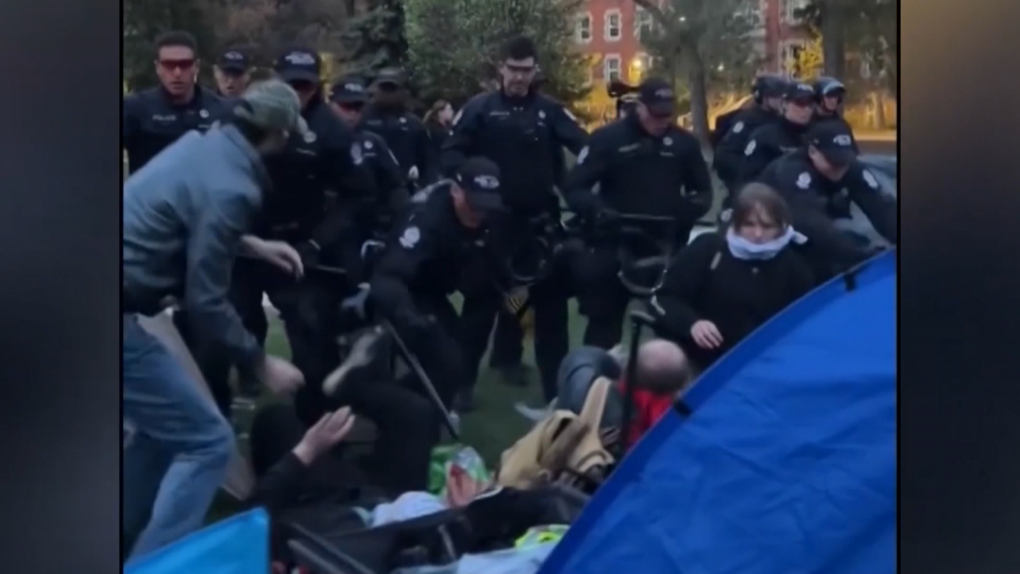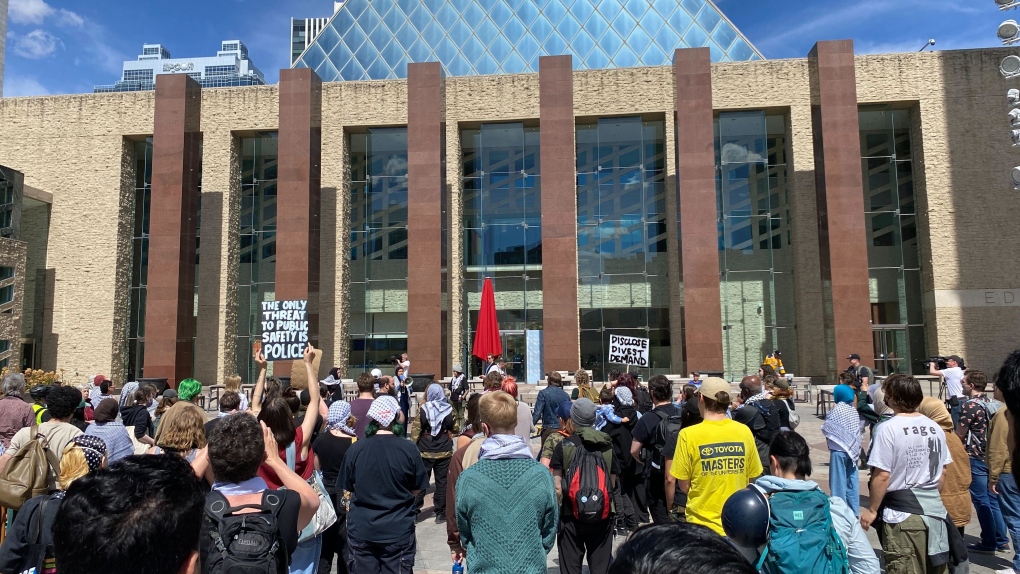
U of A associate dean resigns over removal of student protesters from campus
University faculty members in Alberta are roasting decisions by their respective institutions to have police forcibly remove student protesters from campus, with one professor quitting a leadership role over the matter.
The associate dean of equity, diversity and inclusion in the University of Alberta's faculty of arts resigned Monday, citing an inability to do the job.
"With police marching on our students, on our campus, I can neither protect students nor facilitate the difficult conversations that are needed to advance equity and justice for our community," professor Natalie Loveless wrote to colleagues the next day in a letter, which was shared with CTV News Edmonton.
Early Saturday morning, Edmonton police cleared what had been a three-day protest by students condemning the war in Gaza and demanding the university divest from companies "complicit in occupation, and apartheid and genocide" there.
Video shows officers striking demonstrators with batons. Protesters say police also used a chemical irritant.
Edmonton Police Service says no one was injured, contrary to some reports of injuries by the campers.
"While I did not witness the eviction of the camp, I did witness the protesters being forced off campus and the unnecessary use of non-lethal but very frightening weapons and batons. I witnessed violence instigated by the police, not the protesters," Loveless said in her letter.
She said she witnessed police continue to use force against the protesters off university property.
 Edmonton police use batons while clearing a protest at the University of Alberta in Edmonton the early morning of May 11, 2024. The camp-in protest was organized by students to condemn the war in Gaza and demand the university divest from companies "complicit in occupation, and apartheid and genocide" there. (Source: Instagram / university4palestine.yeg)
Edmonton police use batons while clearing a protest at the University of Alberta in Edmonton the early morning of May 11, 2024. The camp-in protest was organized by students to condemn the war in Gaza and demand the university divest from companies "complicit in occupation, and apartheid and genocide" there. (Source: Instagram / university4palestine.yeg)
"The sound of nonlethal weapons being fired and the sight of batons wielded by militarized police against unarmed students on an apparently public sidewalk after they had been complying with the demand to slowly and peacefully protest their way off campus, is still with me. *I* feel traumatized as an observer and can only imagine what the students, faculty, and community members are experiencing.
"Indeed, I remain extremely shaken, and am still haunted by the sound of guns and the echo of the menacing chant of 'Move! Move! Move!' from heavily-armed militarized police marching with an intent to do violence to peaceful protestors. Not only was this police action unjust and at odds with the university’s mission and values: it caused real and deep harm to all it targeted."
She declined to do an on-camera interview.
Native Studies, law faculty members stand behind students
Loveless also wrote she was "struck" by university president Bill Flanagan's portrayal of the events, which she called "at odds" with what she witnessed.
Flanagan characterized the camp's clearing as mostly peaceful. He claimed only a quarter of the camp's occupants were U of A students. He also referred to hammers, axes, screwdrivers and wood pallets – which the campers said were camp construction supplies – as "potential weapons."
In a separate letter Tuesday, he and the rest of university administration were accused by Native Studies faculty members of failing to uphold their Treaty obligations in part by violating the principles of tâpwêwin, or truth telling.
The letter was published on U of A Native Studies faculty member Chelsea Vowel's website and signed by dozens of university staff, alumni, and Treaty members.
Further, the letter's author stated the protesters better illustrated reconciliatory action than the university.
"This encampment should have served as an example of what is possible. Instead, its existence was perceived as a threat by the same institution that purports to champion and value these commitments," it read.
Members of the law faculties at both the University of Alberta and University of Calgary – which shut down a similar protest days earlier – also published a letter Tuesday expressing "deep concern" that their students' rights were infringed by the institutions and police.
The faculties defended the students' right to protest on university campuses, citing sections of the Canadian Charter of Rights and Freedoms and case precedent.
They called on the Alberta Crown Prosecution Service to withdraw all charges, Edmonton and Calgary's police services to submit to a review by the province's police watchdog, and the universities to revoke their trespass notices, apologize, allow peaceful protests to continue, and establish campus protest policy.
Loveless asked the U of A to recognize using the police to clear the camp was a mistake, stop making "unsubstantiated" claims the camp was dangerous, rescind any disciplinary action taken against community members, and "meaningfully engage" with the students' demands.
Vowel and her co-signatories want the U of A to meet the students' demands and uphold the principles of reconciliation.
Tuesday protests
To show solidarity with those who were removed from the U of A by police, protests were scheduled Tuesday for both the U of A and Edmonton City Hall.
Hundreds attended the two events with many wearing keffiyehs, the chequered scarf that has become a symbol of Palestinian support.
 People gathered at Edmonton City Hall on May 14, 2024, to protest the University of Alberta's decision to have police shut down a protest on campus days earlier. That protest called on the university to divest from companies "complicit" in occupation, apartheid and genocide in Gaza. Edmonton police used batons and a chemical irritant to remove protesters in the early morning of May 11, 2024. (Dave Mitchell / CTV News Edmonton)
People gathered at Edmonton City Hall on May 14, 2024, to protest the University of Alberta's decision to have police shut down a protest on campus days earlier. That protest called on the university to divest from companies "complicit" in occupation, apartheid and genocide in Gaza. Edmonton police used batons and a chemical irritant to remove protesters in the early morning of May 11, 2024. (Dave Mitchell / CTV News Edmonton)
Outside city hall, one person held a sign that read, "Disclose, divest, demand."
On campus, signs varied from "Flanagan should resign!" to "Hands off students."
"This is, I think, an issue for the university community," said Florence Ashley, an assistant law professor who signed the letter from law faculty members.
"It's really, really concerning seeing the administration crack down on students who are peacefully protesting and this is something that has concerned both faculty and students, so I'm really heartened to see the support but I'm not surprised because it's so important to stand up for each other's rights."
"I'm here because my university, which I've been at for 27 years, deeply harmed its students in a way that was not called for and is continuing to deeply harm its students rather than taking accountability," added David Kahane, a political science professor who was among those who were removed from campus on Saturday.
"Those students and members of the community and faculty are traumatized. They were deeply harmed. And all the university has done since then is make excuses that involve insulting the people that were in the encampment."
Alberta's premier has said her government would ask the province's police watchdog, the Alberta Serious Incident Response Team (ASIRT), to investigate the use of police force to clear both protests.
Speaking after the U of C called in police but before the U of A did, Danielle Smith called the U of C's decision justified.
CTVNews.ca Top Stories

LIVE @ 11:15 A.M. MT Extent of Jasper wildfire damage still unknown; Alberta Wildfire hosting update
Officials are waiting to learn Thursday morning the extent of wildfire damage in the Jasper townsite of Jasper National Park, which flames began to eat away at the night before.
WATCH LIVE Jasper wildfire burns buildings, while poor air quality forces some fire crews out
Prime Minister Justin Trudeau announced on social media that Ottawa has approved Alberta's request for federal assistance after a fast-moving wildfire hit Jasper National Park and its townsite late Wednesday.
Jennifer Aniston criticizes JD Vance for 'childless cat ladies' remarks: 'I pray that your daughter is fortunate enough to bear children'
Jennifer Aniston is criticizing JD Vance for comments he made in his past about women without children.
Canadian women's soccer team staffer given suspended prison sentence over drone incident, prosecutor says
A Canada women's soccer team staffer has been given an eight-month suspended prison sentence after flying a drone to film the closed-door training session of the New Zealand team on Monday, the prosecutor's office said in a statement.
WATCH LIVE 'Sick to my stomach': People grieve Jasper National Park by sharing favourite photos
As an out-of-control wildfire roared through Alberta’s famed Jasper National Park and its townsite late Wednesday, many are fearing the worst as officials warned of 'significant loss' within the area.
Prince William made $42 million from his newly inherited estate last year, reports show
Newly released financial reports show that William, the Prince of Wales, drew a salary of $42.1 million last fiscal year, his first since inheriting the vast and lucrative Duchy of Cornwall.
Sale of envoy's NYC condo 'expected to exceed' $9M: government
The current official residence for Canada's representative in New York City is 'being readied for sale,' according to a spokesperson from Global Affairs Canada.
'It's certainly a central piece:' Prince Harry blames tabloids for family breakdown
Prince Harry, speaking in clips published on Wednesday from a new documentary, said his legal battles with Britain's tabloid press have contributed to the breakdown of his relationship with the Royal Family.
'I'm so broke': Two Toronto women speak out after losing $76,000 in romance scam
Two women from the Toronto area are speaking out after losing thousands of dollars to a romance scam, including a single mother who lost $62,000.
































